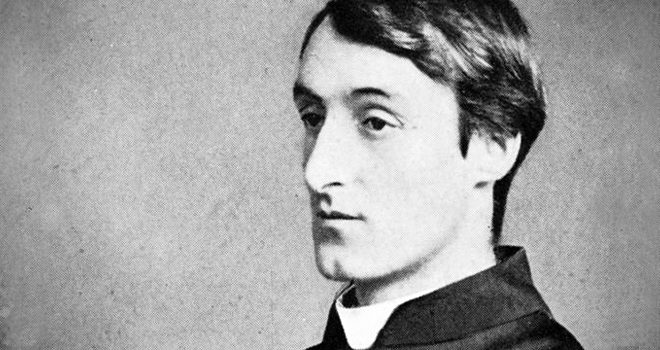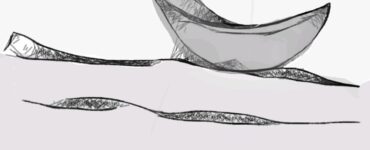By Gerard Manley Hopkins
Part-3 ( Verses 4 and 5)
4
I am soft sift
In an hourglass—at the wall
Fast, but mined with a motion, a drift,
And it crowds and it combs to the fall;
I steady as a water in a well, to a poise, to a pane,
But roped with, always, all the way down from the tall
Fells or flanks of the voel, a vein
Of the gospel proffer, a pressure, a principle, Christ’s gift.
Life is like sand in an hourglass, softly sifted. “At the wall” of the hourglass, the sand looks firm, with no apparent motion. But from underneath, it is mined, and it is steadily falling. As it falls through the hole, the sand makes patterns on the surface, (“combs to the fall”). The “wall” of the hourglass is indeed the walls of the house man builds for himself. If you look at the walls, the house looks fast, but man is unaware of its “soft sift”. It is being “mined” from underneath.( ‘foolish man, which built his house upon the sand … and it fell: and great was the fall of it’. The wise man’s house ‘fell not: for it was founded upon a rock’: Matthew, Ch. 7,v. 24–7).
The next simile , water in a well is a little more hopeful, for it is not water in a running stream. And the wall of a well is not of glass. It is a steadier image. The water in the well is steady, and its surface is like a “pane”. “I steady as a water in a well”. “Steady”, an adjective, is here used as a verb, indicating the element of human effort in the spiritual pursuit. And the water in the well is ever being refreshed by streams trickling down in the shape of “ropes” dropped from the nearby hillsides, ( “Fells or flanks of the voel”). The house of Christ is built on the “voel” , (spelt “foel” ,Welsh for mountain). The “rope” (“roped with” ) of water is “Christ’s gift” dropped, of course, not directly into the well, but on the ground, which seeps constantly and replenishes the well water . It is the Gospel’s “ proffer” ( verb used as noun. Gospel is, it “does” nothing) . Water from the hill flanks is not only like a rope, but it also resembles a vein (“a vein /Of the gospel”). It is the very channel of the lifeblood ensured in the gospel, the blood of Christ. The vein is thus a symbol of constant rejuvenation by the Christ. (‘“Whoever believes in me … streams of living water will flow from within him.” John 7:38-39).
There may also be here a hidden image of mountain climbing, with ropes fastened to the hill walls, supported by grace and faith.
All the three images suggest that the spiritual life is perilous, and requires constant steadying, threatened with collapse at every stage. But to the faithful, the spiritual adventure is ever graced. The rope is ever kept dropped to rescue, to replenish, to rejuvenate the faithful.
The images of sand and water anticipate the coming shipwreck, The Deutschland stuck in the sands of the Thames, off the Kentish coast.
5.I kiss my hand
To the stars, lovely-asunder
Starlight, wafting him out of it; and
Glow, glory in thunder;
Kiss my hand to the dappled-with-damson west:
Since, tho’ he is under the world’s splendour and wonder,
His mystery must be instressed, stressed;
For I greet him the days I meet him, and bless when I understand.
Verse 4 focused on the impermanence of man,( “soft sift /In an hourglass”) ,and the grace of God that keeps a rope dropped for man, both to be hauled and to be pulled up into the heavens. Here the poet looks up and finds the “ glow , glory in thunder” ,the glow of the stars and the glory in thunder. Thunder and lightning go together, and in Hopkins they go together as symbols of God’s warmth and wrath.
The predominant mood of v.5 is wonder, joy and abandon. The poem has a terrible tragedy for its theme, and what is its tone! The poet is blowing kisses “To the stars, lovely-asunder”. “Stars, lovely-asunder”! One feels like crying out ,like Shakespeare’s Richard, “My kingdom! for that “lovely-asunder” ! “Lovely-asunder!” The expression itself is a word-asunder. In its wonder , it is comparable to the Nasadiya Sukta ( The Hymn of Creation) of the Rg Veda (X. 129. Translated, among several others, by Swami Vivekananda,Basham, Doniger). Sheer epiphany! We will come back to this.
The theme of the poem is God’s paradox,his benignancy and wrath.His hauling up the storm struck,and at the same time he is rescuing them by pulling them out of the storm, and up into the heavens.In almost every line, every phrase, and often in every word , single or doubled for the purpose, Hopkins fuses the antithetical aspects of God, of wrath and compassion, of protection and devastation, of order and disorder. Let us look at the opening words of the verse again.
“I kiss my hand
To the stars, lovely-asunder “
This looks like the usual love of nature.C.D.Narasimhaiah,in his introduction to”East West Poetics at work” (edited by him ) chose “the stars, lovely-asunder” for special praise, comparing them, deridingly, to the line in Wordsworth’s Daffodils:
“…all at once I saw a crowd,
A host, of golden daffodils;…
Continuous as the stars that shine
And twinkle on the milky way,
They stretched in never-ending line”
Narasimhaiah rightly ridiculed Wordsworth’s “Continuous as the stars”, comparing with Hopkins’s “the stars, lovely-asunder”.For , the stars are not lined up in a queue “on the milky way”.They are scattered.That is true. But what is to be noted in Hopkins’s expression,beside the starry abandon,is the purpose of the expression , “asunder’. The divine disorder in the starry skies is a reflection of the divine disorder on the earth, and its beauty . Hopkins’s phrase even suggests that God in a playful abandon strew stars in the skies, like a child does marbles.In God’s creation it is not all order,but disorder too, and play.
Nature is literally breathing God, “wafting him out of ” starlight. Though God is “under the world’s splendour and wonder’, he is not experienced. .’His mystery must be instressed, stressed’.The terms Inscape and Instress , though coined by Duns Scotus, have come to be associated with Hopkins. However, this is the only time the term “Instress” occurs in Hopkins’s poetry. God is ever present in his creation,but is experienced only in moments of stress. God reveals himself in starlight and as much in storms. In those moments of stress, God is experienced. That experience is what instress denotes. This experience is not a daily happening. The poet sometimes experiences it , and when he does, ‘I greet him the days I meet him’. And God be blessed!(“I bless him”)
This inscape and in stress is what Prahlada said in the Mahabhagvatam,in the words famous in the Telugu world:”Do not doubt that he is here , he is not there. He is everywhere . Seek him, and you will find him anywhere.”
The point to note in Hopkins’s ‘I greet him the days I meet him’ is the role of man’s seeking . There is a suggestion that although you seek God, you don’t find him. it is God’s grace that allows you the instress. The Kathopanishad says that the divine form disrobes itself before the seeker. (naayamaatmaa…yamevaisha vrinute tena labhyah tasyaisha aatma vivrinute tanoom svaam… Kathopanishad:1.2.23). It is not man’s effort,but God’s grace.
The poet in this verse is anticipating the storm in the poem, and is preparing the reader to see God’s hand in it. The question to ask is not, “ Could God not have stopped the storm?” The question to ask is, “Why did he cause it?” It is not only in moments of bliss that God is experienced,but in moments of blight too. For, what is disaster for the world is part of the divine grace. As he wonders later in the poem: “…is the shipwrack then a harvest, does tempest carry the grain for thee?
Titbit:
Eliot said of Hopkins that Baudelaire is a more religious poet. One could expect that from an Anglo-Catholic convert.And we need not take it any more seriously than Hopkins’s own outcry for England to embrace Roman Catholicism,”Our Kíng back, Oh, upon énglish sóuls” ( The Wreck: v.35). (Did Hopkins say souls? Perhaps he meant soils.) Eliot is right, though not in the sense intended by him. Hopkins is not strictly a religious poet.He is a mystic poet.Baudelaire and Dante are possessed of a moral intensity. Dante’s universe is one of crime and punishment, sin and expiation. In all his poetry, Hopkins encountered one question , like Blake : “Did he who made the lamb make thee?”( The Tiger.) It is not a question though,but unending wonder. Hopkins is not asking a question. He found the answer omnipresent , and was in search of words.









Add comment